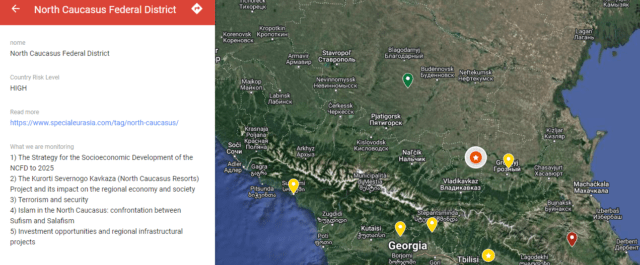The North Caucasus connects Russia with the Middle East and Africa

Geopolitical Report ISSN 2785-2598 Volume 24 Issue 6
Author: Giuliano Bifolchi
The Stavropol territory welcomed representatives from the Middle East and Africa in the event “North Caucasus in the Changing World”, whose goal was to create a link between the region and potential foreign investors and markets.
On October 13th, 2022, in the city of Zheleznovodsk in the Stavropol territory, the North Caucasian Institute of the Russian Presidential Academy of National Economy and Public Administration (RANEPA) organised the forum “Severnyj Kavkaz v menjajushhemsja mire” (The North Caucasus in a Changing World) with the support of the Office of the Plenipotentiary Representative of the President of the Russian Federation in the North Caucasus Federal District and the Public Chamber of the Russian Federation.
The event aimed to identify the North Caucasus’ potential in strengthening Russia’s ties with the countries of the Middle East, North Africa, and Turkey and develop a roadmap for improving and creating connections in strategically important areas. The forum attracted representatives from Egypt, Libya, the United Arab Emirates, Saudi Arabia, Iraq, Syria, and Turkey, as well as members of the business, academic and diplomatic worlds from Africa.
The participants discussed the development of markets for agricultural products, tourist and recreational services, education, prospects for developing industrial enterprises’ export potential and exchanging technologies and knowledge, and implementing joint investment projects.
In the forum framework, Enfil, the official representative of Iraqi Airways in Moscow, and the International Airport “Mineralnye Vody im. M.Yu. Lermontov signed an agreement that will allow the Iraqi company to expand its presence in the air transportation market of the North Caucasus and the Middle East.
North Caucasus’ Role in Russian foreign policy in the Middle East
The North Caucasus is strategically relevant to Kremlin’s foreign policy in the Middle East. Due to its strategic position in the Eurasian geopolitical chessboard, the North Caucasus is a “bridge” between Europe and Asia and a barrier between the Christian and the Muslim world. At the same time, due to its sociocultural and religious background and historical process, the region has strong ties with the Arab-Muslim world and, since the 90s, has attracted the interests of Middle Eastern and Gulf Arab countries.
According to the well-known Russian orientalist-Arabist Dmitry Evstafiev, the Middle East and the North Caucasus are macro-regions where social modernisation has not been completed, and economic modernisation has been interrupted. The regions have experienced competition between socio-political institutions of a different order, both archaic and related to premodernity and modernity, but weakened because of the collapse of both the Soviet and pan-Arab systems. At the same time, there are elements of postmodernity in the form of post-industrial enclaves. In addition, both macro-regions are territories characterised by ethnonationalist movements, border controversies, religious extremism, terrorism, and a confrontation between the local population and the central authority and between the city and the countryside.
Considering the religious and cultural background, the North Caucasus has played an important role in the Kremlin’s foreign policy in the Middle East. For instance, Ramzan Kadyrov’s Chechnya has constantly promoted relations between Russia and the Arab-Muslim world, especially the Gulf Arab countries such as Saudi Arabia and the United Arab Emirates.
Conclusion
In recent years, the Kremlin has hugely financed infrastructural projects in the North Caucasus and promoted the region to attract foreign direct investments (FDIs). Since the beginning of the Ukraine conflict, Moscow has attempted to improve the socio-economic development in the North Caucasus and create a link between the region and strategic international markets in the Caspian Sea region, the Middle East, and North Africa.
In this regard, in August 2022, the Central Bank of Russia spoke about its intentions to launch a pilot project on Islamic banking in Chechnya and Dagestan in 2023. This pilot project might attract interest and financial investments from Gulf Arab countries, especially the United Arab Emirates, which have organised at the end of September 2022 an event in the city of Makhachkala to promote the Emirati national culture and create a link with Dagestan. Also Iran has identified as a strategic asset the city of Makhachkala for port and logistics cooperation in the Caspian Sea region.
Considering that the North Caucasus has had security problems associated with terrorism and local militancy, as demonstrated by the recent arrests of a cell linked to the Islamic State in the Stavropol territory, connecting the region to foreign markets such as the Middle East and Africa and attracting investment could help stabilise the area.
On the other hand, this connection and the arrival of funds and people from Middle Eastern and North African theatres could favour the affirmation or propagation of ideologies such as political Islam or religious extremism that the Kremlin has attempted to contrast for years. In foreign policy, events like this one organised in the North Caucasus allow Russia to create or strengthen ties with strategic markets and try to overcome Western sanctions and economic problems.
